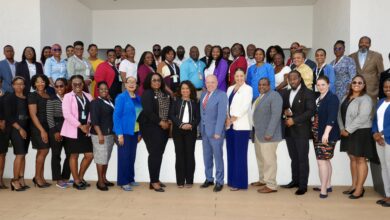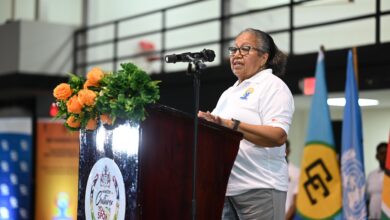Chairman, Dr. the Honourable Leslie Ramsammy, Minister of Health, Republic of Guyana
Honourable Dr. Denzil Douglas, Prime Minister of St Kitts and Nevis and CARICOM Lead Head of Government for Human Resources, Health and HIV/AIDS Senator the Honourable Therese Baptiste-Cornelis, Minister of Health, Republic of Trinidad and Tobago Dr. Mirta Roses, Director, Pan-American Health Organisation (PAHO) Dr. Edward Greene, Special Adviser, Caribbean Public Health Agency (CARPHA) Development Partners
It is my pleasure to represent the Caribbean Community (CARICOM) Secretariat at this landmark event, the Second Annual Partners’ Meeting of the Caribbean Public Health Agency (CARPHA).
I wish to thank Dr. Mirta Roses, Director of the Pan-American Health Organization (PAHO) and her staff for the dedicated and effective nature of their collaboration, not only in the organisation of this Meeting and their gracious hospitality, but also for PAHO’s demonstrated commitment to the implementation process, intent on guaranteeing that CARPHA becomes a reality.
I also wish to commend the CARPHA Steering Committee, Chaired by Dr. Leslie Ramsammy, who is also Chair of the CARICOM Council for Human and Social Development (COHSOD), for its conscientious efforts in dealing with the challenges involved in nurturing the implementation process of this Agency.
When at their Thirtieth Regular Meeting in July 2009, CARICOM Heads of Government approved the consolidation of the five Regional Health Institutions into one Agency; it was on the basis of a series of feasibility studies and consultations at the technical and ministerial levels as well as with a cross-section of stakeholders. Nevertheless, questions continue to be raised: Why is the Region dismantling five Agencies that are performing critical functions? How will the new structure work to the benefit of the people of the Region? Where are the resources for the consolidated agency to come from? What will be the value added? I believe that the substantive presentations at this Partners’ Meeting will fully answer these questions. I will only say here at this point that the deepest appreciation for the fact that it is only by intensifying Caribbean Cooperation in Health, through pooling our resources and sharing services, that our small-sized economies could provide sustainable, first rate public health functions for our people.
These are some of the principles – pooling our resources and sharing services – upon which the Nassau Declaration, issued by CARICOM Leaders in 2001 and entitled “the Health of the Region is the Wealth of the Region”, was grounded. These are principles that formed the basis for functional cooperation in health, as in other areas such as education, disaster management, among others, all essential ingredients of the process of regional integration.
Consider the fact that it was through functional cooperation led by CARICOM and PAHO in the 1980s that CARICOM could boast of being the first developing region in the world to eliminate polio. Caribbean Cooperation in Health, initiated during that same period, revolved around a set of core priorities. These included: an accelerated approach to reducing the spread of communicable and non-communicable diseases; enhancing surveillance and human resources, including public health leadership; information sharing; and more recently, emphasis on mental health issues.
While there is need for greater effort and resources to sustain the evolving goals of the Caribbean Cooperation in Health – now in its third iteration – the record of functional cooperation in health provides some of the most outstanding illustrations of regional integration that is worth celebrating.
One such example is the establishment of the Pan Caribbean Partnership against HIV/AIDS (PANCAP). This network of governmental, non-governmental and development partners, in the formulation and implementation of a Caribbean Strategic Framework, has contributed in no small measure to the enormous gains made by our little Region in prevention, care-treatment and the accelerated approach to HIV.
So much so that at the Tenth Annual General Meeting of PANCAP, the Declaration of Sint Maarten that resulted could dare to advance the aim that by 2015 the CARICOM/PANCAP Region will eliminate mother-to-child transmission of HIV, increase access to treatment by 80 percent and reduce deaths from HIV by 50 percent.
What is clear is that in the context of small-scale and limited resources, these achievements could not be possible without a high level of regional planning and implementation with the support of a variety of stakeholders including, you, our development partners.
CARPHA is consistent with the new modalities for achieving cost effectiveness and value for money that has become a clarion call by most development agencies and no less so for us in the Caribbean Community.
The vision for CARPHA is one of creating an environment in which our economies could draw on a pool of healthy workers. And also one in which our citizens, as well as visitors to our shores, could be guaranteed good public health facilities and regulations.
CARPHA, which must assume the leadership in the public health response to both communicable and non-communicable diseases, is an attempt to consolidate and advance the Region’s health as a critical dimension of development.
CARPHA is more specifically about creating a viable regional structure to respond more effectively to public health emergencies and to secure the health of the people of the Region.
CARPHA is about strengthening public health functions to facilitate an enabling environment in which our economic drivers – our tourism industry, our agricultural and industrial sectors – could perform effectively and along with our food security and water quality, inter alia, could guarantee a healthy environment conducive to investment and economic growth.
The CARICOM Secretariat is pleased that so many of you are here today to be part of this bold venture that is the Caribbean Public Health Agency and which could truly transform the Health Sector in the Caribbean Community.





